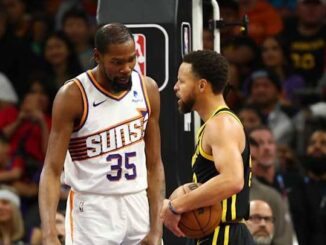The Golden State Warriors lost De’Anthony Melton for the season with an ACL tear. Despite having access to the Disabled Player Exception, the league’s new CBA won’t allow the Warriors to utilize it to get a replacement.
The Warriors are allowed to file a Disabled Player Exception with Melton's season ending injury. It would be worth $6.4M (50% of his salary). But the Warriors are just under the first apron by $534K and not allowed to exceed that threshold. Changes dramatically if Dubs trade.
— Ray Almeda (@rayalmeda) November 21, 2024
The NBA would likely grant the Warriors a Disabled Player Exception, which allows teams to get cap relief when a player is out for the season. That’s the case with Melton about to have surgery to repair his torn ACL, a procedure that requires six months of recovery time at the minimum. The DPE would allow the Warriors to go over the salary cap in the amount of half of Melton’s salary, around $6.4M, to replace him.
But thanks to the punitive restrictions of the NBA’s new Collective Bargaining Agreement, the Warriors can’t actually use the exception. The team’s payroll is hard-capped at the first luxury tax apron ($178.1M) since they used a sign-and-trade in the deal that brought in Buddy Hield and Kyle Anderson and sent Klay Thompson to the Dallas Mavericks. Ironically, signing Melton to the mid-level exception also triggered the hard cap that’s now limiting the Warriors.
The salary cap exception for Melton’s season-ending injury doesn’t reduce the Warriors’ payroll. Golden State is currently less than a million dollars under the apron, one reason they only have 14 players signed to NBA deals, one of which is non-guaranteed. At this point in the season, they don’t have space to add a player, even on a minimum salary.
So their only option is to find a taker for Melton’s expiring contract, which means they’d likely need to send cash, draft picks, or another player or two as a sweetener. Another limitation of being hard-capped at the first apron is that the Warriors can’t take in more salaries in trade than they send out.
NBA owners succeeding in limiting spending. Even teams who want to exceed the luxury tax often can’t by rule, with 17 of the 30 teams being hard-capped in the 2024-25 season. But it also means that for most teams, the Disabled Player Exception becomes worthless. It may not be fair that there’s no recourse when a key player goes out for a reason, but the NBA owners have chosen austerity and profits over fairness for the foreseeable future.


Be the first to comment